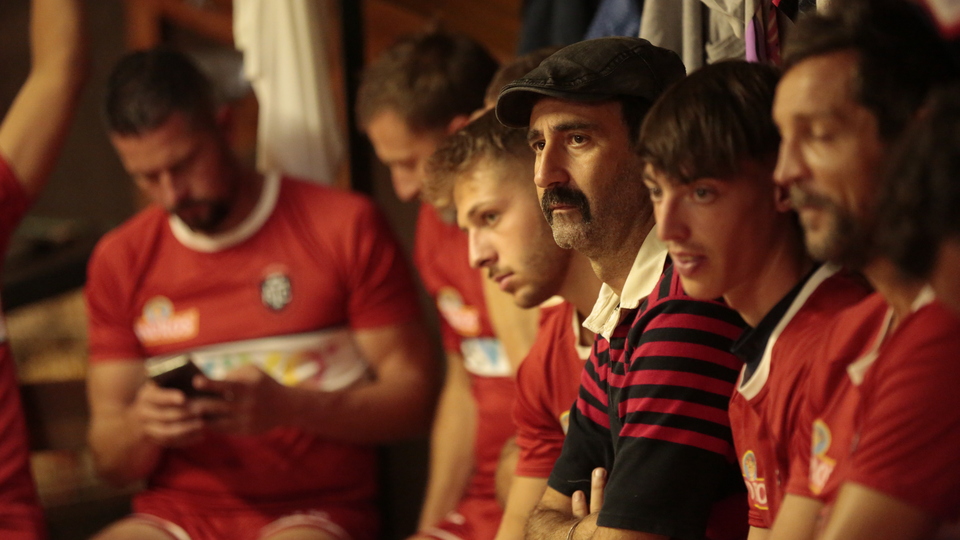Taking a glance at France’s new immigration bills and Australia’s ongoing ‘stop the boats’ dog-whistle campaigning, it is clear that people in both countries share an interest in and controversy over the fates of asylum seekers. In this landscape, Phillip Guilard’s A Chance to Win (2023) airs at the perfect time, exploring community resistance to and acceptance of asylum seekers with a light touch.
A Chance to Win opens with a fairytale-esque story of the long standing rivalry between rugby teams Trocpont-sur-Vezere and Tourtour-les-Bains. The flipping pages of the book seamlessly morph into a townscape as the film kicks off into a community meeting involving the approaching arrival of a bus full of refugee immigrants.
The slow-paced introduction increases in pace when the asylum seekers arrive and protagonists’ Annabel and Marco host them at their hotel. Despite facing the daunting prejudices of an insular community, Guillard finds a comedic outlet in the asylum seekers journeys’ in the rugby pitch. The lives of the townsfolk revolve around this pitch. It is here that they live out their squabbles and victories, approaching rugby with an almost religious fervour that bonds together townspeople and the refugees alike. In fact, on several occasions comedic links between religion and rugby are drawn; when Marco laments God’s oversight of the football team in church, and when Annabel declares that Marco’s mass takes place at a different time — at 3pm on the football field.
These matches and the entire film takes place within the rustic town of Tourtour, which is shot in warm tones and accompanied by a jaunty soundtrack, immersing the viewer in a cheerful, quaint atmosphere. As the story continues to evolve and tension rises between the townsfolk who do not accept the immigrants and those who form friendships with them, a host of warm, loveable characters emerge. Watching the film, I couldn’t help but fall a little in love with Annabel when she smashes eggs on the floor of the grocer who refuses to serve the refugees. I couldn’t help but laugh alongside the brash asylum seeker and rugby player Jawad and the blustering co-coach Matheiu who talks of violently beating the other team exclusively in pastry references.
The film’s clever scripting sweeps one along with these characters, placing our hearts on the line with each rugby match, each trial they must overcome in achieving asylum. In narrowing the focus of a broad issue to a local football field, Guillard strips back a complex issue, showcasing the ways in which people can be united and find belonging through sport.
A nice touch was the prevalence of authoritative and feminine women in leadership positions, subverting what is traditionally a male dominated and hyper-masculine sport. The idea that men find compassion and empathy through rugby, whilst women find inclusion and empowerment, complicates gender roles, revaluing and questioning gendered traits and opening the field of belonging.
However, the rugby-centric nature of the film did raise my curiosity about how one would find belonging should they not wish to partake in rugby. The only character De Gualle who initially expressed doubts about rugby as a sport quickly became a rugby fanatic and ended up giving a fiery pre-game speech to the team before the final match. His humorous and quietly confident manner became bolder and more expressive. De Gualle’s character arc is reminiscent of the advice protagonist and hotel owner Marco gives Salifou, the first asylum seeker to join the sport: “In rugby when you score a try you need to convert it. It’s like you. You are in France to try and be granted asylum but without conversion it remains just a try.”
While these words may differ slightly in translation, it sparks questions as to if there are alternative pathways to finding acceptance or inclusion within a community outside of assimilation. A Chance to Win is a film which questions many community norms and privileges that we tend to take for granted. Upon the film’s conclusion , a warm and hopeful feeling lingered. Ultimately, Guillard’s clever take on a complex issue paintis a simple but powerful message of belonging that offers all a chance to laugh and hope for the future of asylum seekers within their new homes.
A Chance to Win (2023) played at the 2024 Alliance Française French Film Festival.





